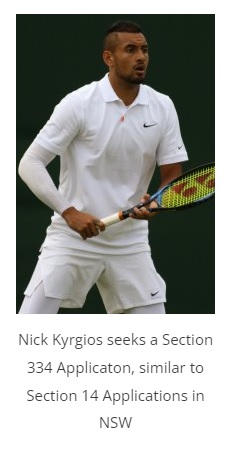- in Australia
- within Litigation, Mediation & Arbitration, Media, Telecoms, IT, Entertainment and Law Department Performance topic(s)
- with readers working within the Banking & Credit, Business & Consumer Services and Telecomms industries
Nick Kyrgios: A young man needing mental health care and assistance
In this blog we examine Section 334 Applications under the Crimes Act 1900 (ACT) and Section 14 Applications under the Mental Health and Cognitive Impairment Forensic Provisions Act 2020 (NSW).
We all know Nick Kyrgios as a 27-year-old Australian professional tennis player. He burst onto the scene as a 19-year-old wildcard entrant at Wimbledon beating the then number one ranked Rafael Nadal. Kyrgios has stated previously that he suffers from mental illnesses such as depression, self-harm, and suicidal ideation
While playing at Wimbledon in July this year, there came that news that ACT prosecutors charged him with common assault in relation to an incident with his ex-girlfriend in December 2021. Common assault carries a maximum penalty of two years imprisonment.
There are recent reports that Kyrgios seeks to have the charges dismissed under a Section 334 Application of the Crimes Act (ACT).
Section 334 application
If successful, a 'Section 334 application' causes the charge to be dismissed and diverts individuals out of the criminal justice system and into a mental health treatment program. It therefore avoids a finding of guilt and importantly a criminal conviction.
To be successful, Kyrgios must establish:
- that he has a 'mental health impairment' that is treatable
- and that there are mental health support services in place for him.
There are reports that Kyrgios suffers from depression and bipolar disorder. If diagnoses of this condition are adduced in evidence, he will overcome the first hurtle.
The next thing that Kyrgios will need to establish is that the matter is appropriate to be dealt with under the provisions as opposed to by law.
These applications go before the ACT Magistrates Court. The Magistrate will want to know:
- about the nature and seriousness of the mental health impairment,
- the period for which the mental impairment is likely to continue,
- the extent to which by reason of the accused's mental impairment the accused is likely to do serious harm to himself or herself or other,
- and whether the ACT Civil & Administrative Tribunal could make an order under the Mental Health Act 2015 (ACT).
It is fairly common knowledge that Kyrgios has his critics, but it may well be that this young man requires mental health care or assistance.

14 Orders Magistrate may make
There are also similar provisions in NSW under a Section 14 Application of the Mental Health and Cognitive Impairment Forensic Provisions Act 2020 (NSW). What this section of the legislation states is:
(1) A Magistrate may make an order to dismiss a charge and discharge the defendant-
(a) into the care of a responsible person, unconditionally or subject to conditions, or
(b) on the condition that the defendant attend a person or at a place specified by the Magistrate for assessment, treatment or the provision of support for the defendant's mental health impairment or cognitive impairment, or
(c) unconditionally.
(2) An order to dismiss a charge against a defendant does not constitute a finding that the charge against the defendant is proven or otherwise.
Section 14 applications
To proceed with a successful Section 14 application, similar to the above provisions in the ACT Section 334 application, one must establish a 'mental health impairment' that affects the way you think, feel, or manage your feelings. Additionally in NSW, you can also have a successful application by establishing a 'cognitive disability' which affects the way you think, communicate, understand, and remember things.
Section 14 applications are heard before the Local Court in NSW before a Magistrate, and if your application is successful you will have to follow a support plan for 12 months, such as attending a certain amount of sessions with a psychologist or psychiatrist, to prevent you returning to Court.



